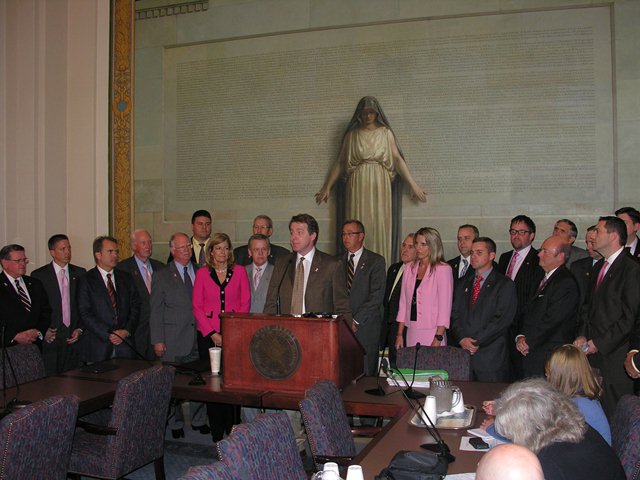In order to provide equal access and equal opportunity to people with diverse abilities, this site has been designed with accessibility in mind. Click here to view
Senate GCCA approves income tax reduction measure
 Sen. Mazzei explains Senate income tax reduction plan at a press conference on Tuesday.
Sen. Mazzei explains Senate income tax reduction plan at a press conference on Tuesday.
The Senate General Conference Committee on Appropriations has given approval to Senate Bill 1230, a measure Senate author Mike Mazzei said would result in meaningful income tax reductions that would stimulate the economy while truly protecting core services such as education, public safety, health care and transportation. The plan would reduce the top income tax rate to 5 percent in 2013 and 4.75 percent in 2014.
“For nearly a year, we’ve been examining Oklahoma’s tax code and uncovering millions and millions of dollars in special tax deals and loopholes that don’t really grow long-term high-paying jobs. We’ve also seen that lowering the rates on Oklahoma taxpayers while increasing the base of taxpayers stabilizes the revenue stream for core services while stimulating economic growth,” said Mazzei, R-Tulsa. “By keeping those tax credits and breaks that work, modifying those that need adjustments and pitching those that don’t benefit our economy, we’ve been able to create a tax cut plan that is fully paid for in Fiscal year 2013 and 2014, protecting our core state services.”
Mazzei, Senate Finance Committee Chairman, said the tax reductions did not come at the expense of low income Oklahomans, veterans or seniors living on a fixed income. He also stressed that while the plan relies on the elimination of ineffective tax credits and modification of others, it does not achieve a tax reduction through the use of revenue triggers.
“We do not believe triggers are a responsible approach given the different volatilities that could impact our economy, such as collapsing natural gas prices and continued instability in European financial markets.”
Mazzei highlighted those credits and breaks to be retained, those that will be altered and those targeted for elimination.
Retained:
Preferences for retirees and active duty military personnel;
Standard and itemized deductions;
Treatment of net operating losses;
Capital gains deduction;
Volunteer firefighter credit;
Nonrecurring adoption expense deduction; and
Tornado property damage credit.
Modified:
Personal exemption allowed only for those under specified income thresholds ($35,000 for single filers and $70,000 for joint filers);
Grocery sales tax relief allowed, but no longer refundable;
Transferable credits made refundable, value reduced by 20% and sunset applied as applicable;
Value of preference reduced by 20% for Film Rebate program, donations to scholarship organizations, CNG investment credits and the investment/new jobs credit; and
Child/child care credit eligibility changed from income of $100,000 to $50,000.
Eliminated:
Over 30 tax preferences available to businesses; and
Some preferences available to individuals including: low income property tax credit and state earned income tax credit.
“I’m extremely proud of our members who have taken on the complex challenge of giving Oklahomans
thoughtful and sustainable tax reform, ensuring our citizens are the top priority, not the special interests and their sacred cows.”
Copy of SB 1230
Copy of Senate tax reform proposal
Senate tax reform summary
 Oklahoma Senate
Oklahoma Senate

